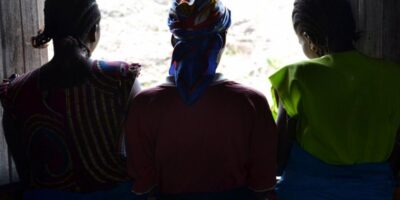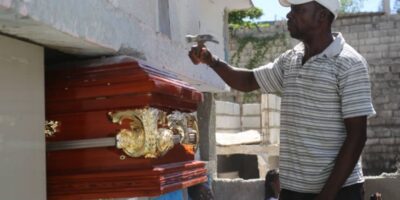The Little Haiti Optimist Club, along with city and county officials, awarded Jean a recognition for his dedication to the Haitian community and his contributions to Haitian pride
Wyclef Jean was the featured guest of the seventh annual Chefs of the Caribbean Celebrity Brunch on Saturday, May 20.
Held at the Little Haiti Cultural Center, the bi-annual event brought together various chefs whose dishes used a combination of spices made famous by people from the islands – the descendants of the first settlers and the African Diaspora.
The Little Haiti Optimist Club, city and county officials awarded Jean for his commitment to Haitians and his contributions to Haitian pride.
Marie Louissaint, President of the Club, said the year’s first of two Celebrity Brunches was to honor Wyclef as a “legend, entrepreneur and philanthropist.”
For his commitment to Haitians and his contributions to Haitian pride.
“He made us proud to be Haitian,” Louissant said recalling the moment when Wyclef draped the Haitian flag around himself during the 1997 Grammy Awards ceremony, where The Fugees won Best Rap Album for “The Score.”
“To me he’s an inspiration whether he gives money or not. He can inspire the youth, he can inspire older generations and give us hope that we can become whatever we want to become,” she explains.
Born in Croix-des-Bouquets, Haiti, Wyclef moved to New Jersey at the age of nine. When he left Haiti, it was still the era of the Duvalier dictatorship: Jean-Claude ‘Baby Doc’ Duvalier had taken over for his father, Francois ‘Papa Doc’ Duvalier.
He can inspire the youth, he can inspire older generations and give us hope that we can become whatever we want to become.
Years later, refining his music composition skills, learning to play guitar and piano, it was in New Jersey, in his uncle’s basement, that Wyclef wrote “The Score,” The Fugees’ debut album released in 1996, which has since been certified platinum six times. Wyclef has won three Grammy awards and has been nominated 10 times; he was also nominated for an Emmy and a Golden Globe.
Wyclef has continued working as a composer and solo artist, writing major hits like ‘Hips Don’t Lie’ sung by Shakira.
In his acceptance speech, Wyclef addressed sensitive issues pertaining to the Haitian diaspora.
During the 1980s, Haitians were running home like it was track and field, recalls Wilkinson Sejour, owner of Chef Creole.
“We had to run back or get beat up or raped,” Sejour said. “It got to the point of fighting for Haitians. We grew up as martial artists, but we couldn’t defend everybody.”
Sejour, 53, said Wyclef made Haitians feel good about being Haitian.
On stage at the Little Haiti Cultural Center, Wyclef received a key to the county from Miami-Dade County Commissioner for District 3 Keon Hardemon, District 2 Commissioner Marleine Bastien, and Mayor Daniella Levine Cava. He also received a key to Miami and another award from Miami Commission Chairperson and Commissioner for District 5 Christine King as well as Chairperson for the Little Haiti Revitalization Trust Board, Lesline Anglade-Dorleans.
Historically, keys to cities are awarded to showcase trust in the individual receiving the award.
The LIttle Haiti Optimist Club also awarded Wyclef with the key to Little Haiti.
Historically, keys to cities are awarded to showcase trust in the individual receiving the award. More recently keys to the city have been awarded to people who have had some kind of societal impact.
During the event, Wyclef also addressed the encroaching gentrification in Little Haiti, declaring that it can be challenged.
”Integration,” Wyclef said, “could be done for people 10-20 years old with incubators set up for them.”
“Focus on what are the jobs of tomorrow,” Wyclef said. “If gentrification is coming, what’s coming in the next 10 years?”
More recently keys to the city have been awarded to people who have had some kind of societal impact.
He also announced a project called “Prince of Port-au-Prince” whose viewers will see a different side of Haiti, he explained.
In partnership with Netflix, Wyclef is hoping to bring tech jobs to Haiti to teach kids how to score and compose music.
He also plans to bring Sodo Mood Lab, his music source library and jingle company, to Haiti for free.
A prolific artist, he is also known for his philanthropic work, namely his non-profit for Haiti called the Wyclef Jean Foundation which does business under the name Yele Haiti.
According to a report by The Smoking Gun published on January 14, 2010 – two days following the 7.2 magnitude earthquake that leveled the capital – Wyclef allegedly benefited financially from Yele Haiti.
In partnership with Netflix, Wyclef is hoping to bring tech jobs to Haiti to teach kids how to score and compose music.
Linking back to a 2006 document from the Internal Revenue Service (IRS), The Smoking Gun – a website which focuses on publishing legal documents, arrest records and mugshots – alleges that Wyclef and a director at Yele received money for their non-profits’ use of a recording studio which they owned, as well as a television station and production company the two have a controlling interest in, and from compensation for a performance in Monaco. The Smoking Gun also reported that Yele Haiti only began filing taxes in 2006 when it was founded in 1998.
The reporter has yet to independently verify the validity of the IRS document cited.
Wyclef has continually denied claims made against him calling them baseless. According to The Guardian, Yele Haiti has provided scholarships, sponsored a Haitian football team, and paid for cooks at schools. And, according to foundation President Hugh Locke, the organization helped communities distribute food to 6,000 families.
Read also : TPS: the endless wait for Haitian applicant
Wyclef faced these allegations as he ran for president during Haiti’s 2010 presidential elections following the earthquake. He resigned as chairperson of Yele Haiti to run for president.
“It felt like something I needed to do at the time,” it reads on Wyclef’s website. “Haiti was in dire need and I wasn’t going to go down in history as just another musician who did nothing and just hid behind the songs.”
Wyclef’s candidacy was especially criticized in part due to the fact that Haitian electoral rules require that candidates own land and live in the country for five years. Wyclef is known to have lived in the US all the way up to the earthquake.
Haiti was in dire need and I wasn’t going to go down in history as just another musician who did nothing and just hid behind the songs.
Following the award ceremony, he performed a few of his most popular songs including “No Woman No Cry” and “Yele” – making sure to salute the public servants in the crowd for their service.
The Little Haiti Optimist Club, which has been hosting Chefs of the Caribbean Celebrity Brunches since 2016, also holds regular after school and summer programs, offers tutoring, and teaches life skills.
Children 4-15 are taught science, technology, engineering, arts and math, financial literacy, business, etiquette and even some finance, including how to trade stocks. They are also offered career training such as job interview preparation.
“You’d be surprised how many kids don’t know how to balance a checkbook or manage savings,” Louissaint notes.
Wyclef also plans to bring Sodo Mood Lab, his music source library and jingle company, to Haiti for free.
The Little Haiti Optimist Club will hold a book bag giveaway in August. It also coordinates ArtBeat Miami, a showcase of Haitian artists, some of whom have artwork on display at the Little Haiti Cultural Center.
One such piece features Wyclef, called “The Haitian Superstar” made by Voltaire Charles-Marc, @MrV_The_Artist on Instagram.
Chefs of the Caribbean Celebrity Brunch is held twice a year, during Art Basel in December and in May during Haitian Heritage Month.
Like any good Haitian bal – ball or party – the rhythms of konpa led to dancing and marked the end of the festivities.
The chefs at the Little Haiti Cultural Center, 10 in total including Wyclef’s sister, used ingredients for dishes well-known among Haitians such as djon djon and mayi moulin. In addition to Haitian heritage, dishes also trace back to Jamaica, Trinidad, the Dominican Republic, and the Bahamas.
Read also : The local variety of coffee disappearing in Haiti
Rose, 37, Wyclef’s youngest sibling, said the event is a mixture of everything, just as Creole is a mixture of different languages.
“It was all of Caribbean cultures intertwined,” Rose said.
Among the attendees, more than 250 according to an Optimist Club member, some have long lived in Haiti before moving to the US, and are now living with family members who, like many Haitian immigrants, left more recently due to the insecurity crisis.
The event is a mixture of everything, just as Creole is a mixture of different languages.
Guerlain Auguste, 62, who left Haiti in 1987, said the event brought out the inner sense of who “you are as a Haitian.”
Laurineza Auguste, who recently migrated to North Miami and now lives with her uncle, Guerlain, found that the event helped her remember what she left – all that’s good about Haiti.
Bart Muce, CEO and co-partner of The Miami Urban Contemporary Experience, said there are people continuing the work of holding up Haitian pride as contemporaries of Wyclef – citing Wilkinson Sejour, Marleine Bastien, Jean Monestime and Marie Louissaint – doing work without a “bullhorn” or a platform like Wyclef.
He noted Sejour as carrying the identity, dignity, and economics for Haitian upliftment, starting with one location and now having seven. “If you were to remove Chef Creole from Little Haiti right now, you would have a desert,” Muce said.
There are people continuing the work of holding up Haitian pride as contemporaries of Wyclef […] doing work without a “bullhorn” or a platform like Wyclef.
Marleine Bastien’s role as an activist for the past 30 years is the definite example of what conversations about Haiti revolve around: the fight and the struggle.
Former District 2 Commissioner, Jean Monestime, proposed legislation to recognize Haitian Heritage Month countywide.
“It’s our experiences that bring people to South Florida; the cultural experience is what people come for. Look at Marie Louissaint, she’s got ArtBeat coming up on its 10th year”, he adds.
Read also : Opinion | Kanye West Will Not Save Haiti
Louissaint, Muce said, is not getting paid for her work, but she took on a similar role as Wyclef.
“She’s showing you her investments,” Muce explains. “She’s the same as Clef on her particular community level. What would have happened in the marketplace on that Saturday? Probably nothing, or not on that level.”
“I think anybody – not just Wyclef – if you’re tutoring kids, feeding the homeless, mentoring, people think that everything has to be about money, but there’s so much you can do without money.” Louissaint argues.
© Cover image : timeout
Gardez contact avec AyiboPost via :
▶ Notre canal Telegram : cliquez ici
▶ Notre Communauté WhatsApp : cliquez ici







Comments